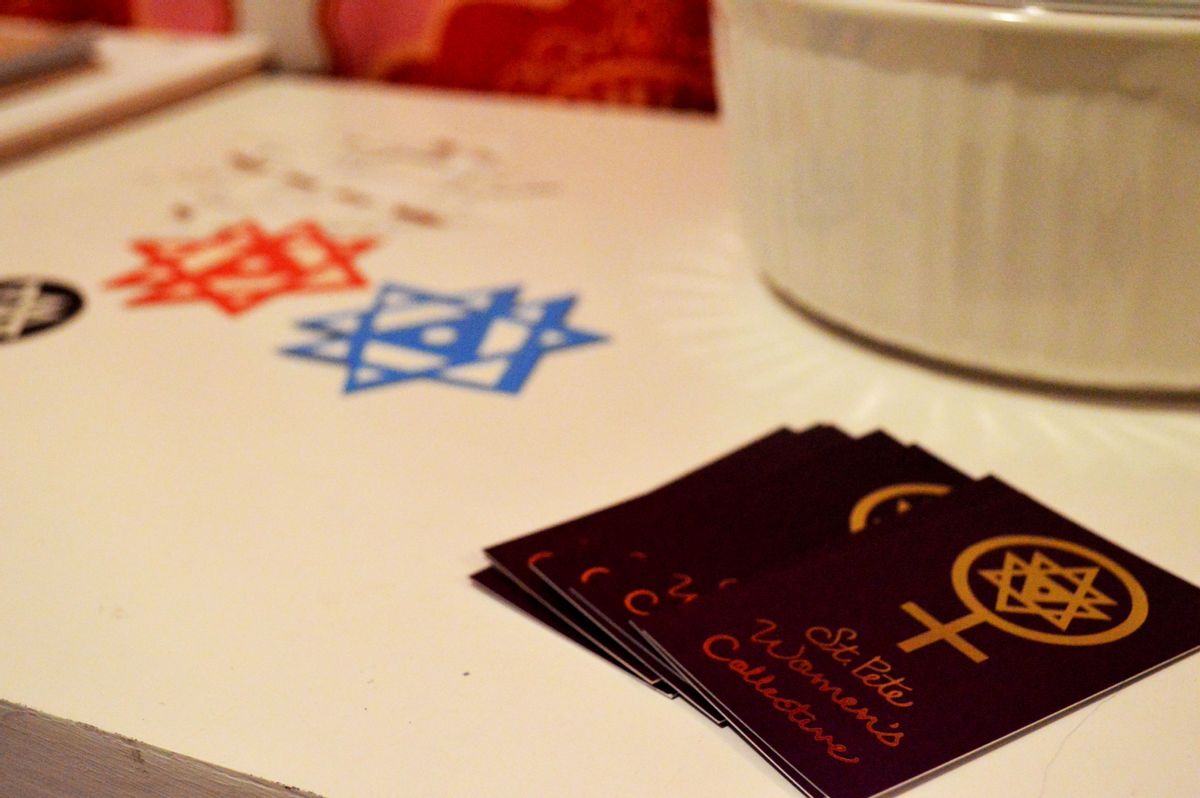 On a table in the St. Pete Women’s Collective house rests a Scrabble rack with tiles arranged to spell "BOSS LADY." In the main room stands a large painting of a bathing suit-clad woman who holds a gold gun. Throughout the house, there are books with titles such as "Stitch ‘N Bitch" and zines like Trigger Warning.
On a table in the St. Pete Women’s Collective house rests a Scrabble rack with tiles arranged to spell "BOSS LADY." In the main room stands a large painting of a bathing suit-clad woman who holds a gold gun. Throughout the house, there are books with titles such as "Stitch ‘N Bitch" and zines like Trigger Warning.
The collective’s board, made up of six artists, signed the house’s lease a little over a year ago on the day of Donald Trump’s inauguration. The inauguration timing felt cosmic; it felt liberating.
“I had a vision for a space where women, femmes, and allies could come and network,” said Ashley Sweet, 31, a SPWC founder, “to share power, resources, and collaborate in a safe space.”
Along with Sweet, the collective’s board members include Emily Stone, 26; Jeannette St. Amour, 23; Mitzi Gordon, 41; Tiffany Elliott and Jodi Chemes. The artists often collaborate through their mediums, which range from etched raccoon skulls to recycled paper to fine jewelry.
“It gives us way more opportunities as a group, because everybody knows everybody,” said St. Amour. “We find that we’re stronger together.”
The collective’s artists came together out of necessity, as they’d been priced out of other studio spaces — notably St. Pete’s Bloom Art Center, which shuttered its warehouse space in 2017. St. Petersburg’s downtown and surrounding areas have recently seen an influx of investors, in part, as Stone said, because of the area’s “galleries and cool art shows.”
“You would think the movement in our city would benefit people us like us — the creators,” said Stone. “But next thing you know, none of us can live here as artists.”
The interest in the area has made it difficult to find affordable housing. Gordon, who runs a bookmobile, lived in Tampa, then moved to St. Pete in 2014. Entire blocks, she said, are changing their tone, and the investments drive out local art space.
“I may not be able to afford to live in the city by myself,” she said, “if I couldn’t share the burden of maintenance with the collective.”
They chose St. Pete’s Kenwood neighborhood in part because of its designation as artist enclave, which allows flexibility in the operation of businesses out of personal residences.
Their corner house has four subdivided rooms that were created from a closed-in wraparound porch of a technically one-bedroom house. Two board members currently live in the house full-time, another part-time, and others frequently use the studios and shared workspaces.
“We all recognize what a special place this is,” said Gordon. “There isn’t another place like it for us.”
The collective’s logistics took time to plan out and solidify. The six, Sweet said, spent many hours in meetings to define how the collective would function. Sweet said such a task could seem difficult as society often socializes women to compete and look at each other with jealousy.
“There’s none of that here,” she said. “There’s enough for everybody.”
Back in the collective’s earliest months, a line stretched around the block for their first major in-house event: A Nasty Women art show. Over 40 artists donated worked, and the show saw a nearly 400-person turnout. The event, Sweet said, raised $1,400 for Planned Parenthood.
After the event’s large turnout, they decided to do more public events. Part of this outreach mission is to connect with other individuals and businesses within the community.
They’ve held events such as Me Too: Survivor Speak Out and Solidarity at St. Pete’s Black Crow Coffee and pop up craft nights. They’re currently planning a Boss Lady Summit to bring together, Sweet said, entrepreneurs, ambitious women in Tampa Bay, artists and business owners.
“What we’re doing right now is an act of the resistance,” said Sweet, “and we’re doing it right here in Tampa Bay.”
In the coming weeks, the collective will hold an open house to recruit new members. They’re accepting applications for shared space members who, Sweet said, can work or bring “feminist propaganda, which is always welcome.”
Studio membership will be capped due to space limitations. The collective’s mission remains to combat harassment, and safety will continue as the priority. Board members hope to find diversity in applications, which are open to all gender identities.
“We would love to have men in this space,” said Sweet, “but they just have to obey our rules.”

Shares